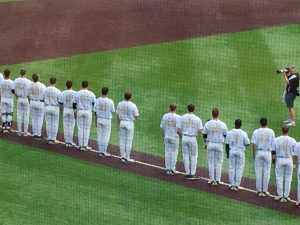This column was published in The Lebanon Democrat this past Tuesday. i think it is one of my better ones. However, my editing was bad. You see, i fried my laptop last Thursday week with a full glass of water on the keyboard. It is in the process of being repaired or the data being retrieved, but it has put me in a quandary and going back to a PC and Windows, rather than the Mac, has thrown me for a loop. Even passwords, especially to my own web site has been a problem.i hope the below revision has been edited properly. With the help of Walker Hicks, the game is back on.
SAN DIEGO – Two events, similar but different, occurred this past week.
Muhammad Ali, nee Cassius Marcellus Clay, in case you have been sequestered, died Friday after an extended battle with Parkinson’s disease. The world has extolled Ali’s virtues and celebrated his life.
Thursday night, Donny Everett, a Vanderbilt freshman pitcher from Clarksville, drowned in Normandy Lake. Donny’s accident was broadcast widely in sports media, and the Commodores were lauded for honoring their fallen teammate while losing to Xavier and Washington and being eliminated from the NCAA.
Both were athletes a cut above the norm and both were honored after their deaths.
Ali’s claim as “The Greatest” was not without merit. He was meteor with a mouth rising to fame when I was in high school and college. I covered his bouts from a distance while working in sports journalism. He eclipsed the magnetism of boxing champions who preceded him and was, in my mind, the last great champion of the “sport of kings.”
Donny Everett, 19, was a gifted pitcher who remained loyal to his commitment to play for Vanderbilt even after being selected as Tennessee’s Gatorade Player of the Year and projected to be a first-round pick in the Major League Baseball draft after his senior season for Clarksville in 2015. He was praised for his 99-mph fastball and his ability to eat up innings. This season at Vandy, he recorded a 1.5 ERA with 13 strikeouts in 12 innings.
Yet there were differences between the two.
Ali was two years older than me. Donny was young enough to be my grandson.
Ali took me through a gamut of feelings about him.
I considered him our country’s hero when he won the light heavyweight Olympic gold medal in 1960.
In February 1964, I listened to the Clay-Liston championship fight on my small radio in my Vanderbilt dorm room. I was mesmerized. While many sports writers and fans found his antics and braggadocio unattractive, I thought he was marvelous.
When he changed his name to Muhammad Ali after joining the Nation of Islam shortly after winning the championship, I questioned him and his new religion. I was on an NROTC scholarship. Ali’s conversion seemed to me as an affront to my religious views and patriotism.
As I was nearing graduation in 1967 and pursuing Navy OCS after being declared 1-A for the draft, Ali declared he was a “conscientious objector,” beginning four years of legal battles before the Supreme Court overturned his conviction for avoiding the draft. Since I had committed to serving my country, it was hard for me to understand Ali’s motives.
As the years progressed, I learned more of Ali’s reasoning for his religious conversion and how he was passionate about equality. I again became an admirer of his views and his boxing prowess. When news of his contracting Parkinson’s disease, most likely due to the many blows while boxing, I was saddened. When he lit the torch at the 1996 opening ceremony for the Atlanta Olympics, I was thrilled.

I knew little of Donny Everett. I saw him pitch a scoreless inning in the SEC playoffs. That was it. But as I read about the person and the athlete, I could not help but draw comparisons to Ali. Donny’s time on earth and his passing will certainly not have the lasting impact Ali has had on the world. Everett’s potential, his conviviality, and his loyalty are gone. He could have been a champion in American sports. He could have had a positive impact on the world as an athletic hero. We will never know.
I believe Ali’s words about how he would like to be remembered would be shared by Donny had the young man had the chance to think about it:
“I would like to be remembered as a man who won the heavyweight title three times, who was humorous, and who treated everyone right. As a man who never looked down on those who looked up to him, and who helped as many people as he could. As a man who stood up for his beliefs no matter what. As a man who tried to unite all humankind through faith and love. And if all that’s too much, then I guess I’d settle for being remembered only as a great boxer who became a leader and champion of his people. And I wouldn’t even mind if folks forgot how pretty I was.”
That’s a beautiful story and one that mirrors my own feelings and my own journey while following the life and career of Ali. The inclusion of the story of Donny Everett brings a contemporary focus to the story of Ali and while it is a story of the loss of great potential and is very sad (Commander Harris would say it is an example of Pathos, not Tragedy in the literary sense) but it also is a message of hope. It says there is always potential for others not named Ali to ascend to the pinnacle and perhaps leave a similar legacy of great good. Ralph Waldo Emerson said that “to know that just one life was made better for your having lived is success!”
Thanks, David. i think you (and Major Harris) are right on.